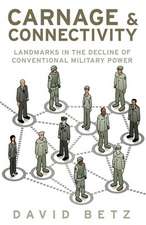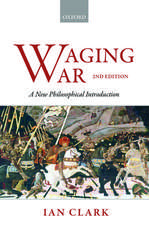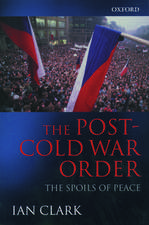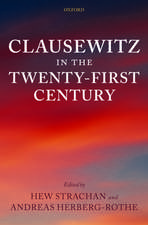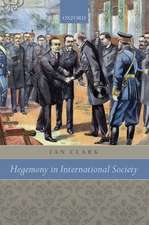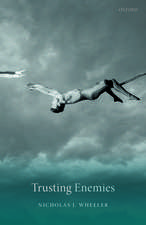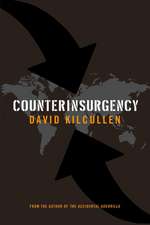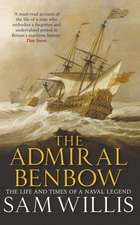The British Origins of Nuclear Strategy 1945-1955
Autor Ian Clark, Nicholas J. Wheeleren Limba Engleză Hardback – 25 mai 1989
Preț: 340.29 lei
Preț vechi: 645.74 lei
-47% Nou
Puncte Express: 510
Preț estimativ în valută:
65.12€ • 67.74$ • 53.76£
65.12€ • 67.74$ • 53.76£
Carte tipărită la comandă
Livrare economică 03-09 aprilie
Preluare comenzi: 021 569.72.76
Specificații
ISBN-13: 9780198275411
ISBN-10: 0198275412
Pagini: 272
Dimensiuni: 145 x 224 x 21 mm
Greutate: 0.48 kg
Editura: Clarendon Press
Colecția Clarendon Press
Locul publicării:Oxford, United Kingdom
ISBN-10: 0198275412
Pagini: 272
Dimensiuni: 145 x 224 x 21 mm
Greutate: 0.48 kg
Editura: Clarendon Press
Colecția Clarendon Press
Locul publicării:Oxford, United Kingdom
Cuprins
Acknowledgements; Introduction; Britain's strategic legacy; Atomic decisions and threat assessment; British origins of nuclear deterrence 1945-6; The doctrine of damage limitation 1946-9; Operational planning and Anglo-American strategic co-ordination 1945-50; Korea and Anglo-American nuclear strategy 1950-2; The global strategy paper and the United States `New Look'; Mass destruction, nuclear war-fighting and delivery systems 1953-5; The hydrogen bomb and deterrence in concert 1954-5; Conclusion
Recenzii
'Clark and Wheeler have produced a lucid and perceptive analysis and have done so in a scholarly and systematic manner.'Times Higher Education Supplement
'essential reading for specialists in military strategy and historians'Christopher Meredith, World Disarm
'interesting book ... the two authors have succeeded in presenting, in chronological sequence, a coherent reconstruction of the principal strands of British thought about nuclear weapons and nuclear strategy in this early period ... Their style is refreshingly free of jargon and their research is scholarly.'Robin Edmonds, Survival
'There are a number of fascinating historical insights here ... which will offer useful evidence both for those who would develop nuclear strategic thinking and those who would debunk it.'Michael Clarke, University of Newcastle-upon-Tyne, Political Studies
`a fascinating book ... Most of the work is based on a careful and detailed study of the pertinent official documents which are preserved in the Public Record Office at Kew. Indeed, the authors provide a helpful and interesting `Note on the Official Records' at the end of their book, which is written solely for technical experts in their field.'The International History Review
`the research is prodigious and based on recently opened documents at the Public Records Office. The result is an important addition to cold war historiography'American Historical Review
'This volume, as well as offering the first independent and detailed historical assessment of Britain's first decade of nuclear planning, forms part of a welcome expansion in British strategic history ... a major contribution to our understanding of the shifts in British strategic thinking during a decade when the foundations of Britain's nuclear force were laid.'Richard J. Aldrich, History
'This book constitutes a major contribution to our understanding of the shifts in British strategic thinking during a decade when the foundations of Britain's nuclear force were laid.'Richard J. Aldrich, History
'essential reading for specialists in military strategy and historians'Christopher Meredith, World Disarm
'interesting book ... the two authors have succeeded in presenting, in chronological sequence, a coherent reconstruction of the principal strands of British thought about nuclear weapons and nuclear strategy in this early period ... Their style is refreshingly free of jargon and their research is scholarly.'Robin Edmonds, Survival
'There are a number of fascinating historical insights here ... which will offer useful evidence both for those who would develop nuclear strategic thinking and those who would debunk it.'Michael Clarke, University of Newcastle-upon-Tyne, Political Studies
`a fascinating book ... Most of the work is based on a careful and detailed study of the pertinent official documents which are preserved in the Public Record Office at Kew. Indeed, the authors provide a helpful and interesting `Note on the Official Records' at the end of their book, which is written solely for technical experts in their field.'The International History Review
`the research is prodigious and based on recently opened documents at the Public Records Office. The result is an important addition to cold war historiography'American Historical Review
'This volume, as well as offering the first independent and detailed historical assessment of Britain's first decade of nuclear planning, forms part of a welcome expansion in British strategic history ... a major contribution to our understanding of the shifts in British strategic thinking during a decade when the foundations of Britain's nuclear force were laid.'Richard J. Aldrich, History
'This book constitutes a major contribution to our understanding of the shifts in British strategic thinking during a decade when the foundations of Britain's nuclear force were laid.'Richard J. Aldrich, History


